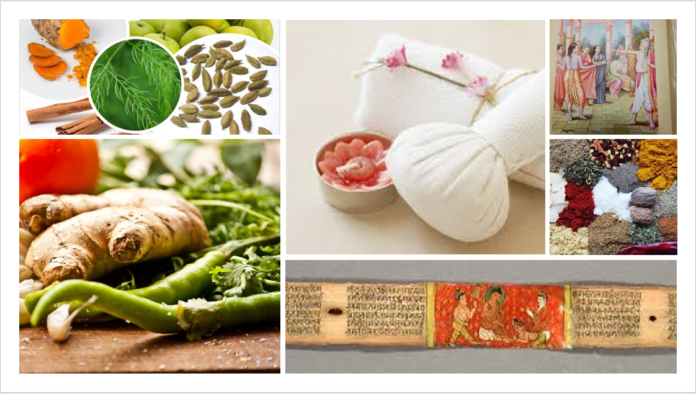The clinical model includes powerful Ayurvedic herbs and clinical therapies like special types massage and Pancha Karma. The counseling model of Ayurveda is easier to do because it is a wellness model aimed at promoting positive health, not trying to treat serious disease. Ayurvedic counseling relates to behavior and lifestyle changes to improve our physical and mental wellbeing.
By Dr. David Frawley
Clinical Ayurveda
It aims to diagnose and treat diseases and become a type of primary care practice. Modern Ayurveda, as in the BAMS doctor program in India, aims at clinical Ayurveda, though it accepts the value of Ayurvedic counseling.
Yet the clinical model is more difficult to practice in the West as it works best with licensing, which Ayurveda so far does not have in the West. The clinical model of Ayurveda in the West is moving slowly and may take years for full recognition, though it is making progress. To treat disease of a serious nature Ayurvedic practitioners may require the recommendation or support of licensed medical practitioners, at least to be safe at a legal level.
In the West the clinical model of Ayurveda is usually divided into an Ayurvedic practitioner program and an advanced Ayurvedic doctor program (which is still being developed). The Ayurvedic practitioner is not a doctor or fully trained clinician but does some clinical therapies of herbs and massage.
Ayurvedic Counseling
The counseling model of Ayurveda is easier to do because it is a wellness model aimed at promoting positive health, not trying to treat serious disease. Ayurvedic counseling relates to behavior and lifestyle changes to improve our physical and mental wellbeing. These include daily and seasonal health regimens, constitution balancing, and adjustment for stages of life. It extends to promoting a positive vitality and a peaceful psychology through natural living, Yoga and meditation. This is usually included in an Ayurvedic lifestyle that is the foundation for both treating diseases and preventing them from occurring in the first place. It may include prescription of herbs, but generally of a mild nature, and massage therapies.
Such a life counseling model is not as developed in modern medicine, which aims at drugs and surgery. In addition, there are various modern counseling fields. Modern psychology is of this type and many other forms of career or relationship counseling, life guidance and spiritual counseling, as well as health wellness therapies.
To work as an Ayurvedic counselor requires less training and expense than to be a clinician or practitioner. It is a good place to begin in Ayurveda, moving from counseling to practitioner to doctor, which may take years to accomplish.
Vedic Counseling and the Four Goals of Life
Next we will examine the relationship between specific Ayurvedic Counseling and general Vedic Counseling. As Ayurvedic Counseling and Vedic Counseling are similar terms, there can be some confusion between the two.
What is Vedic counseling and how does it relate to Ayurvedic counseling? Some people may confuse the two and think that Ayurvedic and Vedic counseling are the same. The fact is that they are related but different. Vedic counseling is a larger field of counseling concerns that includes not only Ayurveda, but other Vedic disciplines of Yoga, Vedanta, Vedic Astrology and Vastu. In other words, all Vedic disciplines are forms of counseling or life guidance.
Another way to look at the relationship between Vedic counseling and Ayurvedic counseling is relative to the Vedic goals of life. These are well known as fourfold as Dharma, Artha, Kama and Moksha.
• Dharma is the pursuit of right action and higher values according to our individual nature, karma and capacities, yet also relative to our role in the universe as a whole.
• Artha is the achievement of goals and objectives, including wealth and the proper means of livelihood and developing prosperity.
• Kama is enjoyment, happiness, love and relationship, which is possible in a lasting manner only through the fulfillment of Dharma and Artha.
• Moksha is the liberation of the consciousness from the bondage of karma and desire, the way of Self-realization. Moksha proceeds through the practice of Yoga and meditation according to Vedanta and its science of consciousness.
These four primary goals of life are based upon a fifth goal as their foundation, which is Arogya, or health and wellbeing of body and mind. Health, vitality and mental composure are the basis for pursuing the goals of life, which are otherwise difficult to accomplish in an enduring manner.
Ayurveda is specifically designed to deal with Arogya or health and wellbeing, specifically the treatment of disease that obstructs them. This is done in order to facilitate the four main goals of Dharma, Artha, Kama and Moksha, which Ayurveda addresses indirectly and are not the specific topics of Ayurvedic study or treatment.
Vedic counseling, on the other hand, is designed to help us directly achieve Dharma, Artha, Kama and Moksha as its primary concern, but recognizes the foundation of Arogya or health and wellbeing through Ayurveda, which it addresses as part of right living and behavioral practices.
Vedic counseling includes Ayurveda as its health and wellness aspect, but is not limited to it and has other considerations relative to the whole of life. Vedic counseling is based upon the examination of dharma and karma as primary factors. It is more of a spirituality, psychology and way of Vedic living.
Vedic Counseling: A Broader Model that can include Ayurvedic Counseling
An Ayurvedic counselor is not necessarily a Vedic counselor. A Vedic counselor is not likely an Ayurvedic clinician, which is a more specialized discipline. Ayurvedic counseling can fit into the broader scheme of Vedic counseling, but can stand on its own. Vedic counseling can also stand on its own apart from Ayurveda.
For an Ayurvedic counselor to be a full Vedic counselor, he or she would need to study other fields of Vedic knowledge as Yoga, Vedanta and Vedic astrology. He or she would need to develop the capacity to deal with other domains of life like career, prosperity, relationship, or yogic spirituality, not just health. Naturally, that is a large range of concerns.
Vedic astrology or Jyotish can be more central to Vedic counseling than Ayurveda as it can deal with all the four goals of Dharma, Artha, Kama and Moksha as well as health and wellness or Arogya, which are indicated in various aspects of the birth chart.
Yet the broadness of the Vedic vision makes this possible to integrate these various Vedic disciplines. Such factors as the three gunas, the five elements, the five sheaths or koshas, the seven chakras, the nature of mind and consciousness, and an understanding of karma and dharma, are common to all the Vedic fields, though addressed from different angles. This allows an integration of Ayurveda into Vedic counseling, depending upon the interests and capacities of the counselor and how he or she may wish to develop their practice. In fact one can and should use all these Vedic disciplines together, though as a practitioner one may need to focus more in one than the other.
In other words, an Ayurvedic counselor can expand their range of concerns to include Vedic counseling. Meanwhile, a Vedic counselor should know the basics of Ayurveda. Yet in terms of a career practice, a Vedic counselor and an Ayurvedic counselor cannot be simply equated. An Ayurvedic counselor can benefit by knowing the basics of Vedic counseling, as a Vedic counselor can benefit by knowing the basics of Ayurveda. An Ayurvedic counselor is a specialized form of Vedic counselor, while a Vedic counselor is a more general life guidance role and can specialize in Yoga, Vedanta, Jyotish or Vastu as well.
Article Courtesy : www.vedanet.com








